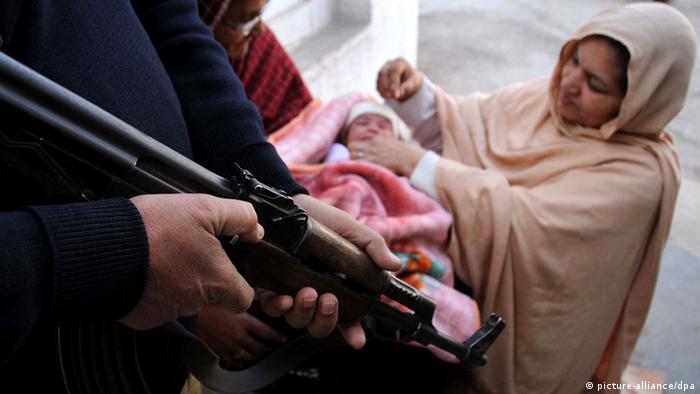Several people have been killed in the latest wave of violence against polio vaccinators in Pakistan. The attacks undermine government efforts to eradicate the virus in one of the few countries where it remains endemic.
A bomb rigged to a bicycle hit a police patrol on its way to guard a polio vaccination team in northwestern Pakistan on Wednesday, January 22 killing six policemen and a boy, the police said. It was the second attack in as many days targeting heath workers. On Tuesday, four gunmen opened fire on a medical team in the southern city of Karachi on Tuesday, January 21, killing three health workers including two women.
The killings come just days after Pakistani authorities began a nationwide drive to eradicate polio. Officials say the militants want to terrorize the polio immunization teams in the city so that they abandon their campaign.
No group has claimed responsibility for the attacks, but in the past, the Pakistani Taliban have opposed anti-polio inoculations and blocked the program in the restive northwestern tribal region of Waziristan.
'Pool of polio virus'
In 2012, the United Nations suspended its polio eradication campaign in Pakistan after the Taliban killed two of its workers in the northwestern city of Charsadda. The UN's World Health Organization (WHO), which partnered with the Pakistani government, said that the decision to suspend the program was made because of the "very precarious" security situation in the Islamic Republic.
Polio is a highly infectious viral disease, mainly affecting children younger than 5. It can cause permanent paralysis and death, but can be prevented through immunization. The virus is spread through contaminated food and water.
Lack of proper access to anti-polio vaccination has led to a rise in polio cases in the South Asian nation. Pakistan, Afghanistan and Nigeria are the only countries in the world where polio remains endemic. The number of polio cases in Pakistan rose from 58 in 2012 to 91 in 2013, out of which 65 were located in the remote tribal region bordering Afghanistan. The WHO recently described the capital of Pakistan's northwestern Khyber Pakhtunkhwa province, Peshawar, as "the world's largest pool of polio virus."
Islamists suspected
Militant Islamists retain a strong clout in Pakistan's northwestern areas and their influence has also grown substantially in the central and southern Pakistani cities, including Lahore and Karachi, over the past two or three years.
Experts say the militants' attacks have made it extremely difficult for health workers to run their campaign. They say that the failure of the polio eradication drive will be devastating for the country and its already weak economy. "If the polio virus spreads in the country, Pakistanis will be barred from travelling to other countries," Sikandar Januja, an activist in Karachi, told DW.
Janjua said he had no doubt about who was carrying out attacks on the health workers: "The Islamists organizations, including the Taliban, al Qaeda and Jamaat-i-Islami, are killing polio workers. Probably, there are some key al Qaeda leaders hiding in Karachi and the Islamists fear that through polio eradication campaigns the CIA will find and kill them," Janjua added.
In July 2012, Pakistani authorities had to postpone a similar anti-polio campaign in Waziristan after Taliban leader Hafiz Gul Bahadur banned inoculations, claiming the drive was similar to a hepatitis vaccination program run by the imprisoned Pakistani doctor Shakil Afridi. Afridi allegedly helped the CIA find al Qaeda's former leader Osama bin Laden who was eventually killed by the US Special Forces at his Abbottabad hideout in May 2011. Afridi is currently in a Pakistani prison facing treason and murder charges.
Credibility loss
Shahnaz Wazir Ali, an advisor to the former Pakistani Prime Minister Raja Pervez Ashraf, told DW that the Afridi affair had made it difficult for the authorities to conduct anti-polio campaigns. "People think that agents like Afridi work in polio immunization teams, and that might put their lives at risk," she said.
According to Ali, the campaign to eradicate polio was not anti-Islam as propagated by some groups. Wajahat Malik, an Islamabad-based social activist and filmmaker, told DW that since the Afridi incident, "the polio eradication campaign has lost its credibility.
For his part, journalist Nusrat Amin believes anti-progressive forces in countries like Pakistan have often opposed campaigns that are aimed at improving people's lives. "Successive governments have always succumbed to tribal pressures, so it doesn't surprise me if the government chooses to postpone the drive," said Amin.

No comments:
Post a Comment